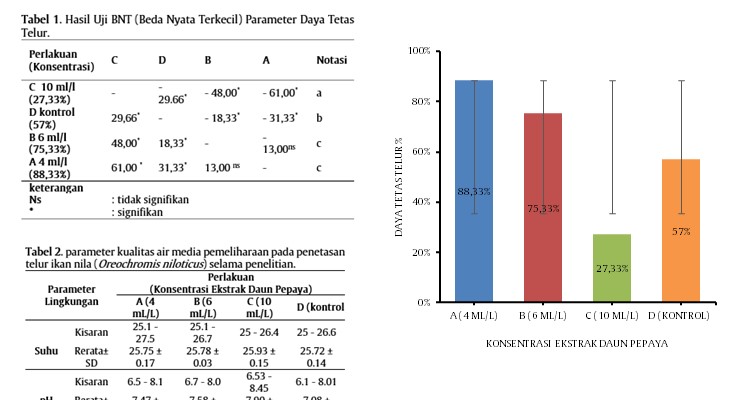Akuatikisle: Jurnal Akuakultur, Pesisir dan Pulau-Pulau Kecil
Full Length Article
The effect of papaya leaf extract (Carica papaya) with concentration on egg hatchability of nile tilapia (Oreochromis niloticus)
Highlights
Generate NLP AI by Wizdam ID.
Abstract
Delays in hatching of fish eggs are influenced by several factors such as water quality instability during rearing, including; temperature, DO, pH. Papaya leaf is one of the plants that can be used to accelerate the hatchability of fish eggs. Papaya itself can be used as a component to boost the immune system because it contains the enzyme papain. The purpose of this study was to compare the hatchability of nile tilapia (Oreochromis niloticus) eggs in the treatment of papaya leaf extract (Carica papaya) with different doses. This research was conducted at the Punten Cultivation Fisheries Installation, Batu City in December 2022. Using a Completely Randomized Design (CRD) where there were 4 treatments, namely: A) papaya leaf extract 4 mL/L, B) papaya leaf extract 6 mL/L, C ) papaya leaf extract 10 mL/L, and D) control without treatment. In each treatment there were 3 repetitions. The ANOVA test was used to compare the effect of papaya leaf extract on hatchability of tilapia eggs, and was followed up with the BNT test if there were significant differences in the treatments. The results showed that there were significant differences in the treatment with the addition of papaya leaf extract on the hatchability of tilapia eggs, with 4 mL/L treatment) being the best treatment in increasing the hatchability percentage of tilapia eggs by 88.33%. There is a tendency that the higher the papaya leaf extract, the egg hatchability decreases.
Keywords
Introduction
Section snippets
Material and Methods
Materials and methods from the full-text PDF of this article cannot be displayed.
Results
Results from the full-text PDF of this article cannot be displayed.
Discussion
Discussion from the full-text PDF of this article cannot be displayed.
Conclusions
Conclusions from the full-text PDF of this article cannot be displayed.
Acknowledgment
Acknowledgment from the full-text PDF of this article cannot be displayed.
Competing interest
The authors declare that they have no known competing financial interests or personal relationships that could have appeared to influence the work reported in this paper.
Conflict of interest
The authors declare that the research was conducted in the absence of any commercial or financial relationships that could be construed as a potential conflict of interest.
Ethical approval acknowledgements
No ethical approval required for this article. All procedures followed were in accordance with the ethical standards of the responsible committee on human experimentation (institutional and national) and with the Helsinki Declaration of 1975, as revised in 2008 (5)
Supplementary files
Data sharing not applicable to this article as no datasets were generated or analysed during the current study, and/or contains supplementary material, which is available to authorized users.
References (1)
Angriani, R.; Halid, I. & Baso, H. S., 2020. Analisis pertumbuhan dan kelangsungan hidup benih ikan nila salin (Oreochromis niloticus, linn) dengan dosis pakan yang berbeda. Fisheries Of Wallacea Journal, 1(2): 84–92, ISSN: 2746-6876.
Ariani, N.; Monalisa, M. & Febrianti, D. R., 2019. Uji aktivitas antibakteri ekstrak biji pepaya (Carica Papaya L.) terhadap pertumbuhan Escherichia coli. JCPS (Journal of Current Pharmaceutical Sciences), 2(2): 160–166.
Ariffansyah, 2007. Perkembangan Embrio dan Penetasan Telur Ikan Gurame (Osphronemus Gourami) dengan Suhu Inkubasi yang Berbeda. [Skripsi]: Fakultas pertanian Universitas Sriwijaya.
El-Gamal, A. E. E., 2009. Effect of temperature on hatching and larval development and mucin secretion in common carp, Cyprinus carpio (Linnaeus, 1758). Global Veterinaria, 3(2): 80–90
Fauzia, S. R. & Suseno, S. H., 2020. Resirkulasi Air untuk Optimalisasi Kualitas Air Budidaya Ikan Nila Nirwana (Oreochromis niloticus). Jurnal Pusat Inovasi Masyarakat (PIM), 2(5): 887–892.
Harahap, K.; Febri, S. P.; Komariyah, S. & Hasri, I., 2021. Efektivitas Penggunaan Ekstrak Daun Pepaya (Carica papaya L.) Sebagai Pengendalian InfestasiArgulus sp. Pada Ikan Koi (Cyprinus carpio). Jurnal Airaha, 10(02).
Haryani, A.; Grandiosa, R.; Buwono, I. D. & Santika, A., 2012. Uji efektivitas daun pepaya (Carica papaya) untuk pengobatan infeksi bakteri Aeromonas hydrophila pada ikan mas koki (Carassius auratus). Jurnal Perikanan Kelautan, 3(3).
Kordi, M. G. H. & Tancung, A. B., 2007. Pengelolaan kualitas air. PT Rineka Cipta, Jakarta, 238.
Latuconsina, H., 2021. Ekologi Ikan Perairan Tropis: Biodiversitas, Adaptasi, Ancaman, dan Pengelolaannya. UGM Press, Yogyakarta.
Mahendra, R.; Susilowati, T. & Prayitno, S. B., 2022. Pengaruh perendaman ekstrak daun pepaya (Carica papaya L.) terhadap daya tetas telur ikan bandeng (Chanos chanos). Sains Akuakultur Tropis: Indonesian Journal of Tropical Aquaculture, 7(1): 45–55
Monalisa, S. S. & Minggawati, I., 2010. Kualitas air yang mempengaruhi pertumbuhan ikan nila (Oreochromis sp.) di kolam beton dan terpal. Journal of Tropical Fisheries, 5(2): 526–530.
Pramleonita, M.; Yuliani, N.; Arizal, R. & Wardoyo, S. E., 2018. Parameter fisika dan kimia air kolam ikan nila hitam (Oreochromis niloticus). Jurnal Sains Natural, 8(1): 24–34
Putri, A. S., 2021. Daun Pepaya (Carica papaya Linnaeus) Sebagai Larvasida Pada Larva Aedes Aegypti Instar Iii. Ruwa Jurai: Jurnal Kesehatan Lingkungan, 13(2): 58, ISSN: 1978-6204, DOI: 10.26630/rj.v13i2.2779.
Rachmawati, D., 2014. Performa Kematangan Gonad, Fekunditas dan Derajat Penetasan Melalui Pemberian Kombinasi Pakan Alami Pada Induk Udang Windu (Penaeus monodon fab.). Journal of Aquaculture Management and Technology, 3(3): 1–7.
Saputry, A. M. & Latuconsina, H., 2022. Evaluasi Pembenihan Ikan Nila (Oreochromis niloticus) di Instalasi Perikanan Budidaya, Kepanjen-Kabupaten Malang.Journal of Science and Technology), 3(1): 80–89
SNI 7550, 2009. Produksi Ikan Nila (Oreochromis niloticus Bleeker) Kelas Pembesaran di Kolam Air Tenang. In: jakarta: Badan Standardisasi Nasional.
Sumahiradewi, L. G. & Sulystyaningsih, N. D., 2022. Efektifitas ekstrak daun Pepaya (Carica papaya L.) Terhadap infeksi jamur pada telut ikan Guramiu (Osphronemus gouramy). Jurnal Perikanan Unram, 12(1): 86–96, ISSN: 2302-6049, DOI: 10.29303/jp.v12i1.281.
Wijayanti, M.; Khotimah, H.; Sasanti, A. D.; Dwinanti, S. H. & Rarassari, M. A., 2019. Pemeliharaan Ikan Nila (Oreochromis niloticus) Dengan Sistem Akuaponik Di Desa Karang Endah, Kecamatan Gelumbang, Kabupaten Muara Enim Sumatra Selatan. Journal of Aquaculture and Fish Health, 8(3): 139–148.
Bibliographic Information
Cite this article as:
-
Submitted
26 March 2023 -
Revised
23 May 2023 -
Accepted
21 June 2023 -
Published
24 June 2023 -
Version of record
3 January 2024 -
Issue date
30 November 2023
-
Academic subject
Aquaculture; Biological Science
Copyright
Sangia Advertisement
Copyright © 2023 Afifa Muning Saputry, Husain Latuconsina, Ratna Djuniwati Lisminingsih. Sangia Research Media and Publishing. Production and hosting by Sangia (SRM™).  This work is licensed under a Creative Commons Attribution-ShareAlike 4.0 International License.
This work is licensed under a Creative Commons Attribution-ShareAlike 4.0 International License.
Disclaimer: All claims expressed in this article are solely those of the authors and do not necessarily represent those of their affiliated organizations, or those of the publisher, the editors and the reviewers. Any product that may be evaluated in this article or claim that may be made by its manufacturer is not guaranteed or endorsed by the publisher.










